2025: Radical Reciprocity
Coordinator: Molly Cowett
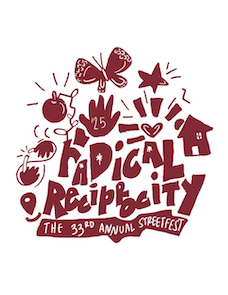
Look out for our design, created by local artist Horacio Portillo-Diaz, to be revealed soon! In the meantime, read about it:
The 33rd StreetFest centers on the theme of Radical Reciprocity, a call to engage with our neighbors not as helpers from a distance, but as partners in mutual learning, growth, and transformation. Every element in this year’s graphic has been chosen with intention to reflect that calling:
The map pin anchors us in place—reminding us that our service is rooted in the specific neighborhoods and communities of Grand Rapids where we live, learn, and work.
The hands represent both reciprocity and the breaking of cycles—signaling that service is not a one-way act, but a shared, ongoing exchange of value and dignity.
The butterfly honors the contributions, resilience, and transformation of immigrant communities—those whose journeys shape and enrich the fabric of our city.
The house speaks to community—not just as a structure, but as a space of belonging, hospitality, and relationship-building.
The apple with roots symbolizes growth and depth—a reminder that meaningful engagement requires us to plant ourselves deeply, to listen well, and to stay committed beyond a single day of service.
Together, these elements form a vibrant picture of what radical reciprocity can look like in action: grounded in place, shaped by mutuality, and always growing deeper.
Verse: 1 Peter 4:10
2024: Weaving Hope. Reclaiming Presence
Coordinator: Mira Moawad
This theme emerged after much brainstorming, prayer, and reflection. We kept coming back to the idea of how God is making all things new in this city – how cycles are being broken and perspectives shifted to recognize what needs to be restored. Every organization we're partnering with has experienced this kind of shift in order to do the work they do. From food security and housing to refugee care, support for single mothers, church and community development, and environmental sustainability – these organizations are weaving a net of hope and restoration for individuals and the community. This is how we arrive at 'Weaving Hope'.
The hope we speak of is both given and recieved through serving and learning. After the upheavals of COVID, many organizations had to reclaim their presence in the city, finding new stability and purpose in response to emerging needs. 'Reclaiming Presence' also speaks to God reclaiming His presence here. As Scripture says, 'Where the Spirit of the Lord is, there is freedom.' This theme resonates deeply with us this year. We want StreetFest to be a transformative experience for the incoming students, where they encounter God through learning about Grand Rapids and serving its community. Our hope is that you and the students leave with new perspectives and hearts eager to serve in the ways you are called to.
The verses we chose to complement this theme are from 1 Corinthians 12:4-7: 'There are different kinds of gifts, but the same Spirit distributes them. There are different kinds of service, but the same Lord. There are different kinds of working, but in all of them in everyone it is the same God at work. Now to each one the manifestation of the Spirit is given for the common good.'
This passage beautifully captures the essence of StreetFest. There are many different projects the students will engage in, and beyond StreetFest, God uses our diverse gifts in unique ways. Yet, it's all for His Kingdom. He is the same God, and though we serve in various capacities, He remains constant – and this is our hope.
Finally, the art you see was created by the talented Emily Griffin, a student at Calvin. If you know her, you've seen her creativety at work. She has captures the theme perfectly, depicting the weaving over the city of Grand Rapids and illustrating the growth that comes from it. The artwork is special, continuing the long-lived tradition of StreetFest by visually reflecting the theme and serving as a powerful reminder of our shared mission.
2023: Listening to Our Community, Joining in Renewal
Coordinators: Kate Witvliet & Blessing Amoah
"Listening to Our Community, Joining in Renewal," described the posture we hope students will adopt for their StreetFest experience and service-learning, but also throughout their time at Calvin and beyond. It is motivated by a deep care for the place we live: its people, creation, and communities. Intentional presence in place begins with listening to our community, getting to know our neighbors, and joining the work that they are doing.
Listening requires an active and intentional posture of humility, openness, and empathy. We want our incoming class to pay attention to the strengths, challenges, injustices, needs, and hopes of our community. We want to intentionally reflect on how history has shaped who we are and who our neighbors are We hope students notice the strengths of the community and celebrate them. We hope students notice the injustices in our community and lament them. Through listening and reflection, students will gain understanding, insights, and a new capacity for empathy. By actively listening, we can better understand the diverse needs and aspirations of our community members. Good listening is always necessary to pave the way for informed decision-making, inclusive spaces, and equitable solutions.
Listening both motivates and informs action. We want students to pay attention to the work of renewal that is already being done in our community. How are community members, local churches, and organization pursuing justice and renewal in their community. How can we join this work of renewal?
Joining in renewal can mean actively participating in service-learning oppertunities, advocating for social justice, and fostering collaboration with community leaders and organizations. We strive to build strong partnerships and meaningful, reciprocal relationships with local organizations, churches, and community members who are doing incredible work. We hope to our students can join in collaboration, as well as amplify the voices of our neighbors by sharing the stories we learn. We aspire to move beyond a passive surface level engagement, but to have active, long-term investment in our partners. We aspire to partner in pursuit of shalom, collaborating agents of renewal.
Joining in renewal reflects Calvin UNiversity's mission to cultivate graduates who are agents of renewal in their communities and the world. It also aligns with the Service-Learning Center's mission of pursuing justic, vibrancy, and shalom in Grand Rapids and the world. Our hope is to equip students to be present in place and seek justice and renewal on the day of Streetfest, during their four years at Calvin and in Grand Rapids, and beyond as they are sent out into the world after graduation. Let us listen, join hands, and work together to create vibrant, inclusive, and renewed communities where everyone's voice is valued, and justice and peace prevail.
2022: Planted with Purpose, Tending Consistently, Gather in Love
Coordinators: Evelyn Macrom & Will Van Zoest
The theme "Planted with Purpose, Tending Consistently, Gather in Love" represents the ambition for incoming students to serve in a way that cultivates positive outcomes in the greater Grand Rapids community. The first part of the theme, "Planted with Purpose", is in the past tense to show that incoming students' goal is not to plant new seeds, but to continue cultivating the seeds already planted here in Grand Rapids. Additionally, these seeds each serve a purpose, fulfilling a need or striving for a goal within their respective community. The second part, "Tending Curiosity", not only represents what the students will be doing with their time at StreetFest, but also the hope that students will continue service-learning with those same seed beyond StreetFest. The third part, "Gather in Love", is in the future tense to show how, though the fruit may not be visible right away, we continue tending for that future promise. Furthermore, tending to and preserving these seeds for the future generations takes communal effort, and being inspired by love is what achieves those ends.
2021: Learn with curiosity • Care deeply • Dwell intentionally
Coordinators: Rebekah Van Zoest & Alicia Lindemulder
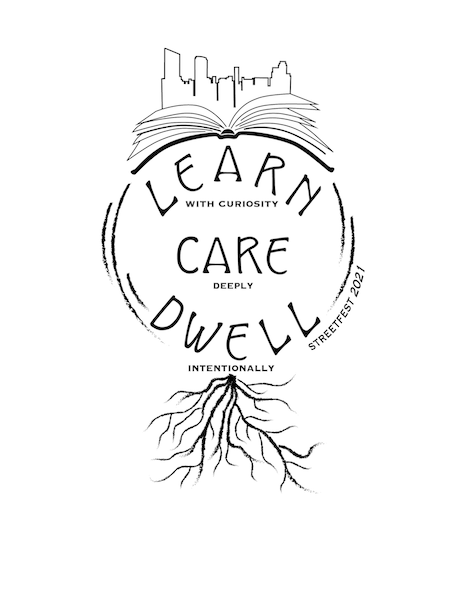
Nina Lu
The theme “Learn with curiosity • Care deeply • Dwell intentionally” reflects our hope for incoming students. We hope that their posture toward college is one of curiosity and intentionality—actively asking questions, listening to stories, engaging in reflection, and investing in their community. We chose the word “dwell” because it portrays the complexity and layers of living well in a place and encapsulates how we hope students choose to live. To dwell involves both body and mind—our physical presence in a place as well as our emotional, intellectual, and spiritual commitment to it. We hope that Calvin students dwell in Grand Rapids by embracing the physical space of the city and the diverse identities found in each community. Whether students are coming to Grand Rapids for the first time, or have lived in the city their entire lives, we encourage students to intentionally explore the physical geography and actively seek to go beyond the bounds of the “Calvin bubble.” We also hope that students dwell by reflecting on what they see and hear in the city—the stories from members of the local community, the histories of different neighborhoods that inform the present, and the work that is currently being done by leaders to advocate for and empower their communities. Interconnected with this idea of dwelling are the concepts of learning and caring. Learning with curiosity requires action. Curious students seek out learning beyond the classroom, taking in the stories and experiences of people and neighborhoods while opening their minds and hearts to care more deeply about justice in the community. Caring deeply prompts one to see value and dignity in every person. We believe that people and places—and the stories they hold—are complex and cannot be captured in one moment or one interaction. When students hold deep care for a place, the injustices that affect people and communities become impossible to push aside. Our hope is for students to become better dwellers in Grand Rapids through deepening their care for this place and committing to active engagement. This process of learning, caring, and dwelling is difficult. It requires effort, investment, and an open mind. It also requires engaging with new ideas that may be different, and perhaps contradictory, to those one grew up believing. We encourage students to embrace this challenge and lean into the discomfort that accompanies growth. Growth requires an intentional step toward action. We hope that students choose to take this step—to learn with curiosity about the stories of their community, care deeply about both the injustice and vibrant life present in the city, and dwell intentionally in Grand Rapids.
2020: Follow Enriching Roots
Coordinators: Amy Piescer & Rylan Shewmaker
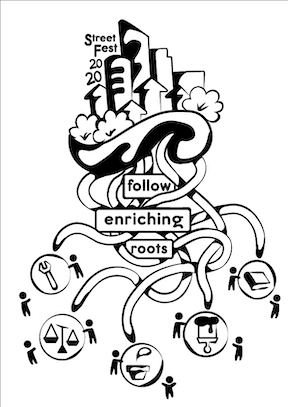
Olivia Mason
“Follow enriching roots” is our challenge to an understanding of college as a highly individualistic experience. Yes, we hope that students will make lifelong friends, will grow in new ways, and will make joy-filled memories of their adventures; but that they will know that they do so as a part of something larger than themselves. Whether we choose to acknowledge it or not, we are not individual islands, leading cleanly independent and uncomplicated lives. Rather, we are all bound up together, our lives and our choices interconnected. We chose the metaphor of roots in our theme to reflect this reality, and to celebrate the richness that accompanies such an understanding. To see oneself as a small part of a grand root system is to recognize that the well-being of others is not separate from one’s own well-being or that of the entire community. To be in community, which we inherently are, is to have a sense of obligation to one another. This necessarily prompts us to address past and present wrongs, but it also reminds us that we are not alone in our lives -- the lifelong friends we make, the adventures that we have, the challenges we face that prompt us to grow, are made all the more precious by recognizing our inherent interconnectedness with our community.
We hope that incoming students will grow deep roots in this place and recognize the interplay of these roots with others -- not just others on dorm floors, or in classrooms, but throughout Grand Rapids as a whole. Just as no person is an island, neither is Calvin University. As students begin to venture off-campus, or even to dive more deeply into Calvin, they will eventually see something that doesn’t sit quite right with them. When they do so, we hope that they will remember our dream for them: that they will follow enriching roots. Seeing injustice in its full darkness may be new to a student, but it is far from novel in our city; the interconnectedness we’ve previously celebrated may demand painful confrontations with one’s own complicity, yet it also means that many others see what we do, or live it themselves, and have felt their own calls towards action.
When a student encounters injustice, then, we hope that they will first respond with an orientation of listening and learning, particularly to those who live the reality that one has recently come to see. Again we challenge the inward, self-oriented approach through which we might laud ourselves for our vision and assume an attitude of fixing these newly-revealed problems through our own merit, or creativity, or selflessness. To truly do good, to seek to emulate Christ, is not to assume one’s own ability to fix others’ realities, but to listen to the voices of those affected, to ask questions and to truly seek to learn. Those who best understand the needs of a community are those who make up said community. As a result, we want to encourage students to follow the example of those already seeking change within their communities -- to take this time to seek first to be helpers before they hope to be leaders, to shift away from an inward orientation and lift up others before themselves.
We hope, then, that students will push themselves to be well-rooted listeners, amplifying the good work they witness around them -- that they will follow enriching roots.
2019: Choose Wholehearted Living: Care About Place
Coordinator: Lindsay Owens
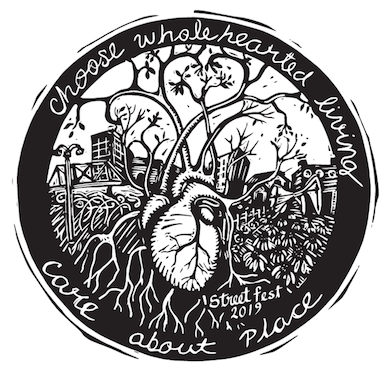
Alynn Guerra
The theme “Choose Wholehearted Living: Care About Place” was selected for this year’s StreetFest because it encompasses our hopes for what students will begin to learn and engage in during their time here at Calvin and beyond – to actively choose to live wholeheartedly through caring for the places where they live. When I think of what it really means to be a Calvin student and to have an authentically Calvin experience, Calvin’s mission “to think deeply, act justly, and live wholeheartedly as Christ’s agents of renewal in the world” comes to mind. Here at Calvin, we seem to have a good understanding of what it may mean to think deeply and act justly (although there is always more work to be done in these areas), but wholehearted living seems more elusive.
“Wholehearted” is defined as “complete sincerity and commitment” and exudes ideas of passionate, absolute, unrestrained, and genuine devotion towards something. At Calvin, living wholeheartedly as Christ’s agents of renewal is to live with complete sincerity, commitment, and devotion to active involvement in renewal work in the world and specifically with the communities we find ourselves in. Genuine wholehearted living requires our whole heart, deep thinking, a commitment to justice, and throughout all of this, a devoted care for our local community. When we truly care about the communities we live in and build relationships with organizations and community members, it becomes much harder to overlook the injustice and oppression that fellow community members face. It becomes harder to stereotype others, build barriers that divide “us” from “them”, and accept one pervasive, glossed over story about community members. Care for a community looks different for everyone but it often includes things such as community engagement, service-learning, and intentional living in the community.
Caring for place requires making a choice to actively engage in and care for our communities. We make so many choices each day, but sometimes in the busy-ness of life, we choose not to make a definitive choice – we carry apathy towards actively choosing. But in a way, not choosing is still making a choice to be uninvolved and to not care. It is easy to forget our choices and our responsibility to make them. It is especially easy to overlook the choices we never make. Nevertheless, it is up to us to make a choice. Choosing to care and the steps we make towards caring are never easy. But wholehearted living, justice work, thinking deeply, and devoting oneself to the community aren’t easy tasks. The work we all do in these areas will never be quite finished. None of us are perfect. There is perhaps always more we could do. Nevertheless, the invitation is still there. Will you join in on this mission to choose to live wholeheartedly through caring about place?
2018: Seek Justice // Listen, Learn, Love
Coordinator: Brianna Rutgers
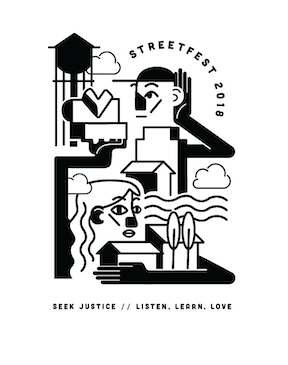
Shannon Mack
When thinking about how to guide new students in engaging with new communities and individuals, I was struck by a quote from Wendell Berry. He said “the name of our present society’s connection to the earth is ‘bad work’ – work . . . that enacts no affection and gives no honor. Every one of us is to some extent guilty of this bad work. This guilt does not mean that we must indulge in a lot of breast-beating and confession; it means only that there is much good work to be done by every one of us and that we must begin to do it.” There is good work to be done on this earth and one way for this to be lived out is through seeking justice. Bad work cannot exist if justice reigns.
Although justice must be sought, it is not the whole picture. Justice is an end goal, but there are things that must be done for us to get there. Listening, learning, and loving are basic skills we must employ in order to properly seek justice. It is important to recognize the place of each skill and to see that each cannot exist without the others and still produce the same result. Listening to others is the only way to learn what needs to be addressed, and addressing issues well can only happen if love is present.
We hope that through this day and beyond, students will learn how to seek justice and see the importance of listening to, learning from, and loving community members and the communities themselves. Although Seek Justice // Listen, Learn, Love is not the perfect way to do good work, it is a great place to start. There is good work to be done – we must begin to do it.
They will rebuild the ancient ruins
and restore the places long devastated;
they will renew the ruined cities
that have been devastated for generations.
--Isaiah 61:4
2017: Love Justly: Commit to Place
Coordinator: Abby Kroon
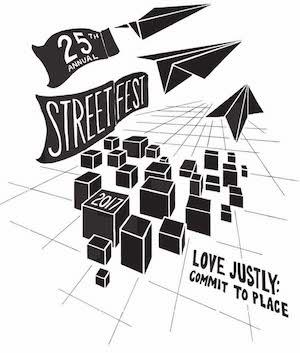
Tia Wierenga
Love Justly: Commit to Place is the theme for StreetFest 2017. We chose this theme because it invites participants to think about what it really means to love a place in a way that is just. Often when we think about love, we think of it as a sentiment, but love is more than that. To love is to be concerned for and unselfishly pursue the flourishing of another. Love includes actions done in the pursuit of justice and shalom. So, how do we do this? One way is through joining with others to commit to place. Place consists of the people and environment.
During StreetFest, participants will interact with community members and organizations in Grand Rapids who are deeply committed to their place. Students are invited to take the opportunity to listen and to learn from these organizations, and begin to imagine ways to commit to their place at Calvin, in Grand Rapids, and beyond. We hope that students will take action and serve in ways that will promote justice; we hope that students will learn to Love Justly.
2016: Listen to the Stories of the Neighborhoods
Coordinator: Beth Sherman

Josiah Hanchett
When we think about service, our mind often goes straight to action. We think about painting, cleaning, organizing, or weeding. While action is important and necessary, it must be preceded by knowledge, because it is difficult to do the work of pursuing justice and shalom in this world if we do not have the context or understanding for the work we are doing.
The first step in acquiring knowledge and understanding is listening. Instead of relying on our own assumptions, we must listen to the voices of community members; people who have lived, worked, and invested in the places we will visit, making them the experts of their neighborhoods, organizations, and community needs. They are able to share stories that highlight the history, assets, and needs that exist within a neighborhood. When we enter into service with a desire to listen, we learn that the previous stories we assigned to a neighborhood are often incorrect or incomplete.
At StreetFest, we encourage all new students to empty themselves of preconceived notions and stereotypes, and instead listen to and reflect on stories they hear from community members. However, listening is not a one-time experience- it is a posture that must be developed and practiced continually. After StreetFest, we encourage students to continue listening to the different stories about Grand Rapids and its 32 distinct neighborhoods.
As students continue this process of listening and learning, we hope that they begin to wrestle with the question of how to respond based on what they have learned. This response may be in the form of action, committing oneself to a neighborhood or organization, but it also may be in the form of continual listening. Therefore, we encourage all first year students to begin the lifelong practice of listening to the stories of the neighborhoods.
2015: Faithfully Present in [PLACE]
Coordinator: Mariana Perez
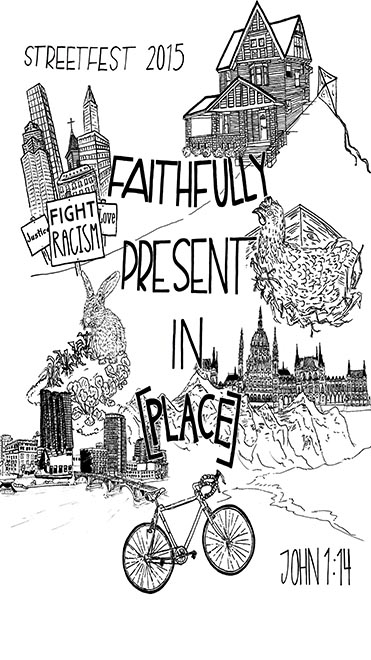
Teunis Verwijs
First year students coming to Calvin College are going to be part of an institution whose mission it is to equip “students to think deeply, to act justly, and to live wholeheartedly as Christ’s agents of renewal in the world.” This is a lofty goal to have as a college and to aspire to as students.
StreetFest is an invitation for students to engage in that goal. It is a goal in the context of the hope for a particular future and of the present reality. The hope for the future is Shalom; that all things will be as they should be. The present reality is that things are not as they should be.
John 1:14 reads “And the Word became flesh and lived among us, and we have seen his glory, the glory as of a father’s only son, full of grace and truth.” In the same manner, despite our human, imperfect attempts, we can still show up and be faithfully present. In doing so, we are putting ourselves in a position not to be served, but to serve.
We hope that students will practice thinking deeply, acting justly, and living wholeheartedly as Christ’s agents of renewal in the place they go during StreetFest, during the rest of their time at Calvin and beyond. We hope that students will be faithfully present in [PLACE].
2014: Engaging PLACE: Presence. Listening. Action. Commitment... Everyday
Coordinator: Maaike Mudde
Teunis Verwijs
The places where we have been and our current place are woven into the fabric of who we are, how we live, and how we see the world. Place is integral to our identity and how we approach the work that we do.
In Jeremiah 29, God calls His people to seek the shalom of their city. During StreetFest, first-year students will explore this call by engaging their current city and place—Grand Rapids. StreetFest is a day to practice what it means to be present, listen, act and be committed to the places God has brought us; we do this daily and continually as a part of our Christian calling. First-year students will learn from people and organizations who have been present, listened, acted and been committed, day by day, to the work of God in the city of Grand Rapids. We hope this day will create a longing in students to seek the shalom of the places God calls them to throughout their lives, joining in God's work in His world.
2013: Stepping Out: loving the city. learning from neighbors. living the call.
Coordinator: Nic Scobey
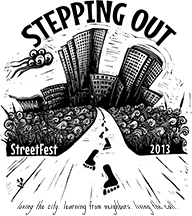
Alynn Guerra
The theme for this year’s StreetFest is Stepping Out: loving the city. learning from neighbors. living the call. This theme references Matthew 14:22-33 when Peter steps out of the boat and joins Jesus to walk on water. Stepping Out is not just about moving our feet, or even our whole body. It’s about intentionally facing things that make us uncomfortable. In essence, Stepping Out is all about fighting complacency and challenging the world around us. It’s time to imagine things we may not yet fully see. The theme is not just the single action “Step Out,” but the repeated action of taking step after step after step. We should remain unsettled with the world’s brokenness and desire for it to be better.
We see the theme “Stepping Out” in practice through our community partners. They have dedicated their careers to serving and learning within their communities. They are committed to their unique neighborhoods, participating in both the easy and the tough times. Without our community partners, we would just be thrusting ourselves into the community without any knowledge of the history, people, or resources of each neighborhood. However, by partnering with churches and nonprofit organizations that have established connections with their communities, we have the opportunity to learn from and with them.
Throughout your time at Calvin, there will be many opportunities for you to practice Stepping Out. Friends, floor mates, clubs, classes, chapel, professors, and more will challenge you physically, mentally, emotionally, and spiritually, so prepare to be stretched. Only you can choose how you respond to these opportunities. Stepping Out should be uncomfortable. Don’t be afraid to ask questions, to challenge the way things are, and to make a mess of things other people think are fine. And always remember to ask, “What’s my next step?”
Watch the chapel service that started out the day
2012: Discover: Respond
Coordinator: Anna Casto
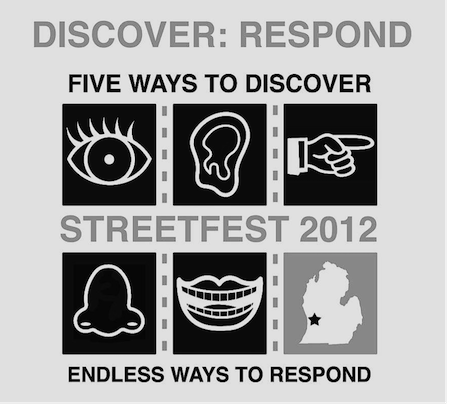
This year’s StreetFest theme is Discover: Respond. This theme reminds us that our service becomes more meaningful when informed by careful reflection and attention. Like service-learning, StreetFest is about discovery, and discovery is about having our hearts and minds open and attentive to the things that happen around us. StreetFest is an opportunity to discover Grand Rapids and the organizations that do good work here. You can encourage your group to respond by getting involved in their Residence Hall Community Partnerships or other service-learning opportunities such as ACT tutoring, blood drives, spring break trips, etc. It is our sincere hope that students’ discoveries during StreetFest will lead them to respond by finding ways to invest in the communities they become a part of, both on and off Calvin’s campus.
Hear remarks from StreetFest 2012 Coordinator Anna Casto and Calvin President Michael LeRoy or watch the Chapel Service that kicked the day off.
2011: Courageous Awakening: Opening Hearts and Minds to the City
Coordinator: Emily Wolffis
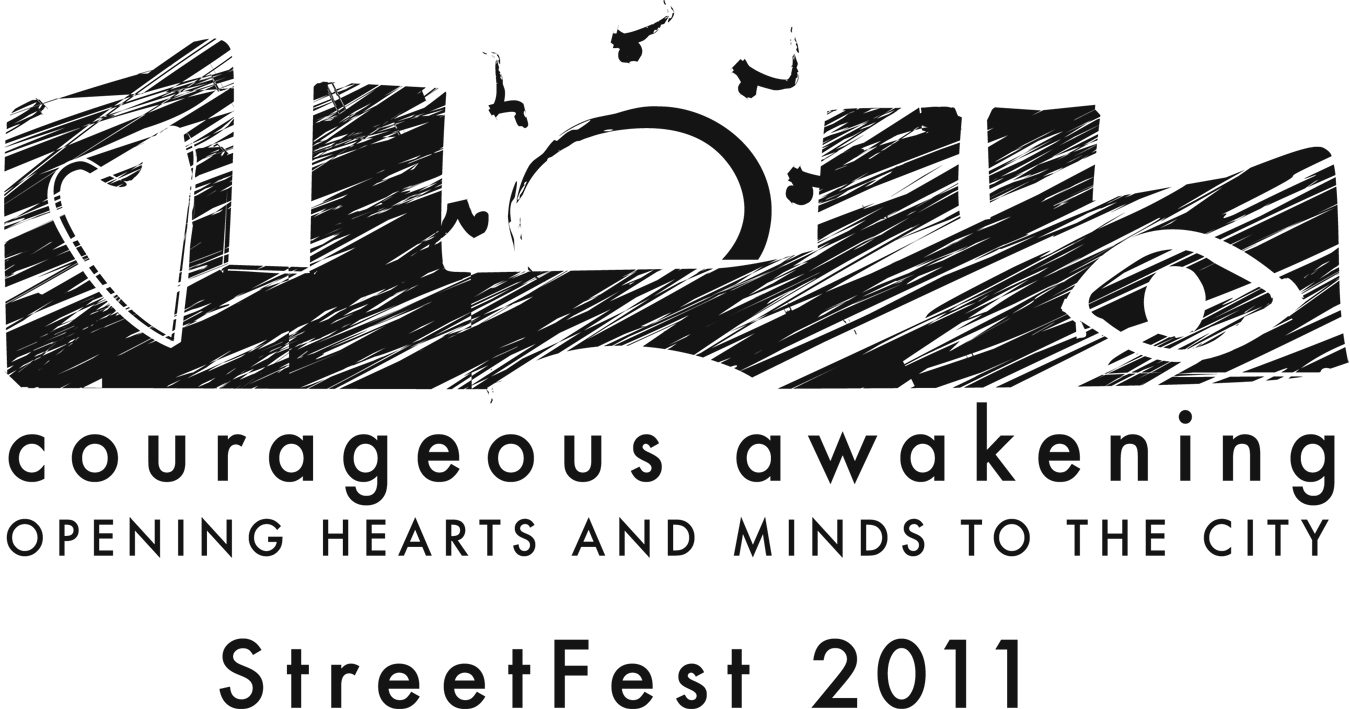
Nathan Goddard
What does it mean to be a part of the place we live? How do we experience community? Is being involved in the community we live in important?
Our goal with this theme is to encourage Calvin students, staff, and alumni to take the time and courage to open their eyes to their city: its strengths and its challenges. Psalm 34:8 reinforces this idea when we are instructed: “open your mouth and taste, open your eyes and see how good God is”.
This command shows us that courageous awakening is something we must choose to do. It will always be easier to ‘stay asleep’ or rather, be uninvolved in our respective communities because we are tired, afraid, busy, or simply don’t care and lack interest in the well-being of our city. We must go into our city with a heart and mind that are willing to see and experience new things. We must open our eyes and our ears to hear what is going on in our city. In spite of weaknesses you might see: poverty, injustice, immorality, suffering, lost hope, etc. we want you to also see a community’s strengths and be aware of what they have to offer: flourishing businesses, a deep history, and/or a powerfully positive community spirit.
So how do we get involved and put ourselves in situations where we can really experience our city in this way? Here at the Service-Learning Center at Calvin College, we believe that service-learning is a great way to get into our community and be awakened to ideas of justice, love, and righteousness and as a result, want to respond in love by helping out at further one-time events and maybe even by becoming further involved as a faithfully present face in the community. But this is no easy task. It is a challenge to get involved and live intentionally so that we invest our love into where we live as we practice a continual (frequent, repetitive, constant) state of wakefulness.
2010: Beautiful Feet
Coordinator: Christina Crider

Rebecca Garofano
"How beautiful on the mountains are the feet of those who bring good news, who proclaim peace, who bring good tidings, who proclaim salvation, who say to Zion,‘Your God reigns!"
The theme for StreetFest this year is “Beautiful Feet” which is derived from the verse Isaiah 52:7. The passage describes the beauty of the feet of those who proclaim peace, bring good tidings, proclaim salvation, and praise the reign of God. The theme “Beautiful feet” was chosen for two reasons. First, we wish to urge students to develop beautiful feet, by proclaiming good news and working towards peace in their communities. And second, and more importantly, urging the students to recognize and show gratitude towards the people in the Grand Rapids community who have beautiful feet.
People with beautiful feet are those who have a willing heart and have taken action in pursuing service to their community. These people are walking in the mud of a community garden, the cement slabs of a city block or the overgrown grasses of abandoned homes. People with beautiful feet are those who work in the desolate areas, the developing and the crowded areas of the world.
People with beautiful feet see the potential of neighbors gathering in the community garden to plant fruits and vegetables, see the cement slabs of city blocks as canvases for local artist and children to draw on, and see the community pulling its resources together to revitalize overgrown grasses of abandoned homes.
We hope that StreetFest students will catch a glimpse of people with Beautiful Feet and see the beauty of Grand Rapids communities, so that they may be inspired to recognize their place in this community and develop beautiful feet of their own.
2009: Walk Humbly
Coordinator: Karen Van Dyke

Rick Beerhorst
Although in the same sentence as “do justice” and “love mercy” (Micah 6:8), “walk humbly” is not met with the same enthusiasm. God doesn’t gives us the option of walking humbly, he commands us to. The hope for StreetFest is that this idea of walking humbly will be explored and that students, faculty, and staff will commit to a new way of seeing and participating in this world.
Walking can be powerful- it was the pace from which Christ administered his love on the least of these in society. If we are to emulate Christ we must also walk- walk in order to notice the details of God’s creation, walk to create opportunities for meaningful conversations, but most importantly walk to be in stride with those who are struggling.
Humility can be applied many ways as well. First, as we walk through life we must be humble before Christ. Our savior left heaven to die for this spoiled world. He lived with prostitutes, prisoners, non-Christians, and by doing so showed that they were just as deserving of his attention and saving as anyone else. We must respect that this was Christ’s focus, and be humbled by the knowledge that we weren’t necessarily the type of people that were on the top of God’s list to see
We also must be humble before others. Too often we elevate, spiritually, people with a well-rounded Christian education, people who have clear criminal records, those who attend fancy churches, and people who are gifted with the ability to thoughtfully articulate themselves. As we (should) know, none of these things make a person closer to God. Instead we should be humbled that the people we “serve” are just as connected to God as we are.
2008: To Embrace Fully
Coordinator: Rebecca Garofano
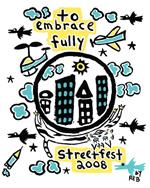
REB
The hope for StreetFest is that it will encourage conversation centered on the importance of place. It is aimed to promote care for place, located within a context of personal relationships and focused on attentiveness to particularity and otherness. In this way, “to embrace fully” serves to emphasize two specific points: For four years these students will be in a particular place, part of which involves the city of Grand Rapids. StreetFest serves to encourage students to engage the community in which they will be living. To promote interaction, exploration, and celebration! It is my hope that dialogue will encourage an attitude of excitement and a willingness to embrace Grand Rapids fully. Conversation will be aimed to foster consideration for future Service-Learning endeavors, promoting a spirit of openness and thoughtfulness.
The idea “to embrace fully” also refers to the individual student’s role within the larger web of interdependent members. For students to care for place, they must recognize their own position within the community and realize both their voice and responsibility. Acknowledging interconnectedness encourages participation as active citizens. The hope is that this service-learning experience will perpetuate a pattern where students continue to offer themselves to this place, through relationship and care.
2007: Renew, Revive, Restore
Coordinator: Laura Wolff
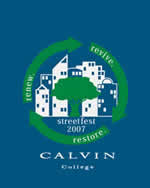
The words of this year’s theme, “renew, revive, restore” are adapted from the phrase “reduce, reuse, recycle.” This is to emphasize not only the importance of environmental stewardship and care of this physical world but a care for others and the community. Unlike the words of the recycle slogan which have very different meanings, the words of this year’s StreetFest theme have the same focus with only slight nuances.
Together these words call us to seek the intended condition of a thriving community. They are a call to work against social injustice and to break out of one’s own comfort zone. As a part of the world’s brokenness we must work toward a renovation of both our own outlook and our relationships. In acting on these words we allow others to live well and do so in community.
Doing God’s work in God’s world calls us to renew, revive, and restore all things for Him. These three words are not ends in themselves, but they are the verbs that, when acted upon, move us toward His Kingdom where peace, prosperity, and joy are realized.
2006: Seeking the Well-being of the City
Coordinator: Devin Byker
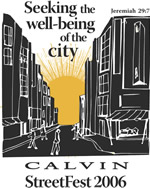
The theme “Seeking the Well-being of the City” captures the essence of the mission of the Service-Learning Center. As we partner and involve ourselves with agencies, organizations, and churches across Grand Rapids, we hope to take part in and further the restoration and shalom-building that Jeremiah addresses in Jeremiah 29:7. We view our vocation as a life not of isolation, but of working towards justice in whatever community in which we may find ourselves, because, as Jeremiah notes, in its well-being, we shall have well-being. As we seek the welfare of the city, we find our own lives to be enriched. Through this striving for the actualization of community, we reap the inherent benefits of community. The reciprocity present in this relationship is directly tied to the signature distinction of service-learning: in which, in the midst of our service, we gain a unique and valuable education we never expected. We hope that first-year students will leave StreetFest with a small taste of the mutual exchange that service-learning is all about.
2005: Enter the Song
Coordinator: Sean Baker
Maria Beversluis & Nathan Tonlaar
This year’s theme “Enter the Song” was chosen as a way to acknowledge and celebrate the restorative work which God has been carrying out through his people over generations. This restorative work, answering God’s calling to make all things new, can be seen, in part, through the agencies and communities in Grand Rapids and their long-standing relationship with Calvin College. By spending a day at one of these agencies, students enter into this song and have the opportunity to continue in this calling. Our hope is that students catch a vision during StreetFest to use their time at Calvin to enter into this movement that has encompassed generations of God’s people bringing restoration to God’s world.
2004: Celebrating Neighborhoods
Coordinator: Alaina Cronkright
“Celebrating Neighborhoods” focuses on the importance of participating in and partnering with mebers of our local community. Involvement in these communities reminds us of our responsibility to God’s call to be active citizens in His Kingdom. Grand Rapids has a lot to offer the students at Calvin College through diverse neighborhoods, people, and opportunities. Helping students realize that God’s Kingdom has a place for each of our gifts and abilities is a key goal of StreetFest. A neighborhood is made up of many different parts working together as one community – schools, churches, govrnment institutions, public transportation, buisnesses, and failies. In some way, StreetFest itself is a reflection of its theme. Like a neighborhood Streetfest relies on the interaction of many different aspects andindividuals. The day is brought together to create a holistic experience – with a worship service in the morning, riding public transportation, recycling our lunches, doing activities from gardening to ice cream socials, and having a time of reflection to wrap up. Each person involved – whether they are a mentor, student, or community member – comes away from StreetFest with different experiences. We celebrate these experiences, the things we learn from the community, and the many opportunities surrounding us in Grand Rapids.
2003: In Pursuit of Shalom
“Shalom” at first glance ay make you think of “Peace” or “a Jewish greeting”. It is more than that. Micholas Wolterstorff, former Calvin Philosophy Professor and writer, says, “Shalom is both God’s cause in the world and our human calling. Shalom at best is enjoyment in one’s relationship. To dwell in shalom is to enjoy living before God, to enjoy living in one’s physical surroundings, to enjoy living with one’s fellows, to enjoy living with oneself. We are not to stand around, hands folded waiting for shalom to arrive. We are workers in God’s cause, his peace workers.” Shalom is working now to taste a bit of the secind kingdom of God. It is living life to the fullest. As Christians we long for the day when the blind see, there will be no more tears and injustices. We long for Shalom; we must pursue it.
Specifically for the StreetFest Shalom is working alongside members of the Community and learning from them–painting, laughing, cleaning, talking with and enjoying the day with members of the community. It is a day in which we hope that Shalom will be made a little clearer, and the first-year students will begin to engage in the pursuit of it while at Calvin College.
Isaiah 11:6-8 and Romans 12 speak of Shalom, I encourage you to read these passages, and think of them in the context of what Shalom can look like for StreetFest.
2002: My Place in the Puzzle
Coordinator: Michelle Ounanian
Service-Learning at Calvin College is an important means to discovering your individual place in the larger puzzle picture that is life. Our responsibility as citizens of the kingdom requires that we keep in mind the original picture God has in mind at creation – a picture of Shalom, or the way things are meant to be. This shalom implies justice, harmony, and wholeness. As service-learners, we seek to join God in the work of redeeming all of our world, through creative acts of service that happen alongside roommates, friends, faculty and staff members from Calvin, as well as members of our local and international communities. The call of service-learning brings us into contact with people and places that allow us to see the big picture of God’s world more clearly. We invite you to explore service-learning in your classes, with your residence hall, with your weekends or spring break and as way of discovering your place in the Kingdom.
2001: Joining the Dance
Coordinator: At Calvin College, Service-Learning is a joyful participation in the Dance of the Kingdom. In service-learning we are not so much seeking to do God’s work as to join God’s work. God is at work in every part of the world, restoring justice and shalom. Through becoming involved in service-learning, you have an oppertunity to explore the ways God may be calling you to Join The Dance. An invitation to service-learning is an invitation to open your eyes, ears, and heart to where God is working and to allow the Holy Spirit to lead you towards your own unique place within the dance.
2000: Who is My Neighbor?
When confronted with the question ,“Who is my neighbor?” Jesus does not respond directly or simply. He responded with the story known as “The Good Samaritan”. And the question posed by the teacher of the law had the same emphasis that we would place on this question: “Who is my neighbor?” Who must I treat in a neighborly way? What sorts of persons fall inside or outside the boundaries of neighborly obligation? Yet Jesus ends his story with a different question: “Who was a neighbor to the man that was hurt?”
In choosing the question “Who is my neighbor?” as a theme for the Service-Learning Center this year, the message appears to be clear: Everyone – black, white, rich, poor, educated and uneducated – is our neighbor. Yes, this is true. But perhaps the more profound messages within the story of the Good Samaritan can only be answered by turning the questions around: “Who is a neighbor to you?”
Through service-learning this year, we have an opportunity to live with both sides of this question. Who are our neighbors? And who are neighbors to us? To whom are we extending kindness and mercy and who is extending it to us? Your answers will begin to be shaped, not just by rules, but by the story that emerges from our experiences.
1999: Let Justice Roll Down
Amos 5:24
To be a person, who follows Jesus, is to participate in bringing about justice in the earth. It is what God requires of us: To do justice, love mercy and walk humbly with our God. (Micah 6:8)
But what does doing justice mean? What is justice, really? How does one live a life doing justice? How do justice and mercy interact with each other? How does one maintain a faithful and humble relationship with God while engaging in the work of justice? These questions are central to an education at Calvin College and ones we consider together as a Christian community. These are also questions for each of us as individuals as we seek to follow Jesus Christ in the world.
Service-Learning is about engaging in the journey of learning about justice. The Service-Learning Center has identified four basic, but very challenging, learning goals that are integral to all service-learning activity:
- To learn to relate to others as bearers of God’s image – even the poor, the sick, the old.
- To bridge social and economic barriers between people
- To understand the broader context and causes of the needs which exist
- To discover and develop a personal vision and capacity for service in a broken world
In service-learning we recognize that we don’t have all the answer, but trust that as we step out of faithfully and humbly, God himself will teach us.
1998: The Calder
Coordinator: Miriam Ipple
This year’s theme had just an image of “The Calder” instead of a written tagline. The Calder is a sculpture in downtown Grand Rapids, and is often used as a famous landmark. This image was chosen to represent StreetFest’s connection to the city of Grand Rapids.
1997: Tied into a Single Garment of Destiny
Coordinator: Katy Frey
This theme was taken from Martin Luther King Jr.’s Christmas sermon on peace. The goal is for first-year students to experience the inescapable “network of mutuality” which Dr. King discusses. StreetFest gives the first-year students an opportunity to express a sense of belonging to this community in positive ways.
Our records indicate that while StreetFest started in the fall of 1993, it did not have a yearly theme until 1997. If you know any information about StreetFest that would improve this page, please email slc@calvin.edu. Thank you!






